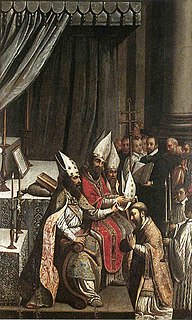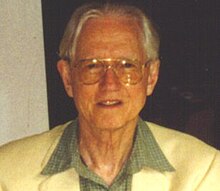
Apostolic succession is the method whereby the ministry of the Christian Church is held to be derived from the apostles by a continuous succession, which has usually been associated with a claim that the succession is through a series of bishops. Christians of the Roman Catholic, Eastern Orthodox, Oriental Orthodox, Old Catholic, Moravian, Hussite, Anglican, Church of the East, and Scandinavian Lutheran traditions maintain that "a bishop cannot have regular or valid orders unless he has been consecrated in this apostolic succession". Each of these groups does not necessarily consider consecration of the other groups as valid.

In certain Christian churches, holy orders are the ordained ministries of bishop, priest (presbyter), and deacon, and the sacrament or rite by which candidates are ordained to those orders. Churches recognizing these orders include the Catholic Church, the Eastern Orthodox, Oriental Orthodox, Anglican, Assyrian, Old Catholic, Independent Catholic and some Lutheran churches. Except for Lutherans and some Anglicans, these churches regard ordination as a sacrament. The Anglo-Catholic tradition within Anglicanism identifies more with the Roman Catholic position about the sacramental nature of ordination.

Clergy are formal leaders within established religions. Their roles and functions vary in different religious traditions, but usually involve presiding over specific rituals and teaching their religion's doctrines and practices. Some of the terms used for individual clergy are clergyman, clergywoman, clergyperson, churchman, and cleric, while clerk in holy orders has a long history but is rarely used.

A deacon is a member of the diaconate, an office in Christian churches that is generally associated with service of some kind, but which varies among theological and denominational traditions. Major Christian churches, such as the Catholic Church, the Oriental Orthodox Churches, the Eastern Orthodox Church, the Scandinavian Lutheran Churches, the Methodist Churches, the Anglican Communion, and the Free Church of England, view the diaconate as an order of ministry.

Ordination is the process by which individuals are consecrated, that is, set apart and elevated from the laity class to the clergy, who are thus then authorized to perform various religious rites and ceremonies. The process and ceremonies of ordination vary by religion and denomination. One who is in preparation for, or who is undergoing the process of ordination is sometimes called an ordinand. The liturgy used at an ordination is sometimes referred to as an ordination.
In the Latter Day Saint movement, priesthood is the power and authority of God given to man, including the authority to perform ordinances and to act as a leader in the church. A group of priesthood holders is referred to as a quorum.

The ordination of women to ministerial or priestly office is an increasingly common practice among some major religious groups of the present time. It remains a controversial issue in certain Christian traditions and denominations in which "ordination" was often a traditionally male dominated profession.
Forward in Faith (FiF) is an organisation operating in the Church of England and the Scottish Episcopal Church. It represents a traditionalist strand of Anglo-Catholicism and is characterised by its opposition to the ordination of women to the priesthood and episcopate. It also takes a traditionalist line on other matters of doctrine. Credo Cymru is its counterpart in Wales. Forward in Faith North America (FIFNA) operates in the U.S.
Graham Douglas Leonard KCVO was an English Roman Catholic priest and former Anglican bishop. His principal ministry was as a bishop of the Church of England but, after his retirement as the Bishop of London, he became a Roman Catholic, becoming the most senior Anglican cleric to do so since the English Reformation. He was conditionally ordained to the priesthood in the Roman Catholic Church and was later appointed a monsignor by Pope John Paul II.

In some Christian churches, a reader or lector is responsible for reading aloud excerpts of scripture at a liturgy. In early Christian times the reader was of particular value due to the rarity of literacy.
The Danube Seven — Christine Mayr-Lumetzberger, Adelinde Theresia Roitinger, Gisela Forster, Iris Muller, Ida Raming, Pia Brunner and Angela White — are a group of seven women from Germany, Austria and the United States who were ordained as priests on a ship cruising the Danube river on 29 June 2002 by Rómulo Antonio Braschi, Ferdinand Regelsberger, and third unknown bishop.

The sacrament of holy orders in the Catholic Church includes three orders: bishops, priests, and deacons, in decreasing order of rank, collectively comprising the clergy. In the phrase "holy orders", the word "holy" means "set apart for a sacred purpose". The word "order" designates an established civil body or corporation with a hierarchy, and ordination means legal incorporation into an order. In context, therefore, a group with a hierarchical structure that is set apart for ministry in the Church.

The priesthood is the office of the ministers of religion, who have been commissioned ("ordained") with the Holy orders of the Catholic Church. Technically, bishops and deacons are priestly orders as well, however in layman's terms priest refers only to presbyters and pastors. The church's doctrine also sometimes refers to all baptised (lay) members as the "common priesthood", which must not be confused with the ministerial priesthood of the consecrated clergy.
Clerical celibacy is the discipline within the Catholic Church by which only unmarried men are ordained to the episcopate, to the priesthood in some autonomous particular Churches, and similarly to the diaconate. In other autonomous particular churches, the discipline applies only to the episcopate.
In The Church of Jesus Christ of Latter-day Saints, the priesthood is the power and authority to act in the name of God for the salvation of humankind. Male members of the church who meet standards of worthy behavior and church participation are generally ordained to specific offices within the priesthood.
The Women's Ordination Conference is an organization in the United States that works to ordain women as deacons, priests, and bishops in the Roman Catholic Church. Founded in 1975, it primarily advocates for the ordination of women within the Catholic Church. The idea for the Conference came in 1974, when Mary B. Lynch asked the people on her Christmas list if it was time to publicly ask "Should Catholic women be priests?" 31 women and one man answered yes, and thus a task-force was formed and a national meeting was planned. This first meeting was held in Detroit, Michigan, on Thanksgiving weekend of 1975, with nearly 2,000 people in attendance.

The ordination of lesbian, gay, bisexual and/or transgender (LGBT) clergy who are open about their sexuality or gender identity; are sexually active if lesbian, gay, or bisexual; or are in committed same-sex relationships is a debated practice within some contemporary Christian denominations.

In the liturgical traditions of the Catholic Church, the term ordination refers to the means by which a person is included in one of the orders of bishops, priests or deacons. The teaching of the Catholic Church on ordination, as expressed in the Code of Canon Law, the Catechism of the Catholic Church, and the apostolic letter Ordinatio sacerdotalis, is that only a Catholic male validly receives ordination, and "that the Church has no authority whatsoever to confer priestly ordination on women and that this judgment is to be definitively held by all the Church's faithful." In other words, the male priesthood is not considered by the church a matter of policy but an unalterable requirement of God. As with priests and bishops, the church ordains only men as deacons. The church does not ordain anyone who has undergone sex reassignment surgery and may sanction or require therapy for priests who are transsexual, contending that these are an indicator of mental instability.
The American National Catholic Church (ANCC) is an independent Catholic church established in 2009 as a self-governing entity.
The Wijngaards Institute for Catholic Research is a British "progressive" think tank producing research on controversial issues within contemporary Roman Catholic theology. It does so by coordinating an international network of academics, most of whom are Roman Catholic.











